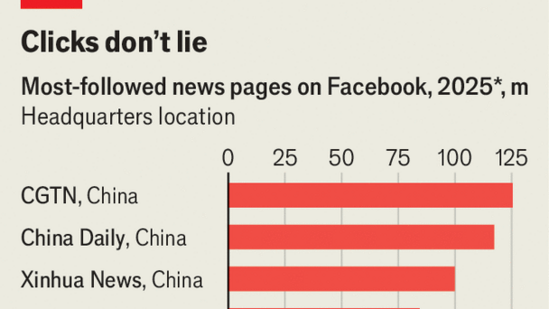SIXTY LUCKY students got the chance to train as journalists last year at African Initiative, a new press agency in Bamako, Mali’s capital. Trainees were given online and in-person lessons in reporting, with the promise that three of them would eventually be hired as full-time staff at the agency. The catch, as reported by Forbidden Stories, a network of investigative journalists, was that African Initiative is run by Russian intelligence.
 PREMIUM China-and-Russia-are-deploying-powerful-new-weapon
PREMIUM China-and-Russia-are-deploying-powerful-new-weapon
Many Western countries are winding down their efforts to broadcast to the world. In March President Donald Trump pulled funding for Voice of America and its sister networks, and dismantled USAID, which funded thousands of journalists around the world. Public broadcasters’ budgets have been trimmed everywhere from Australia to Canada and France.
A battle of ideas is under way. As Western countries quieten down, others are speaking up. China and Russia are investing hundreds of millions or possibly billions on disinformation, Tim Davie, the director-general of the BBC, reportedly said on May 14th. “The future of our cohesive, democratic society feels, for the first time in my life, at risk,” he said in a speech. He called for increased funding to double the reach of the BBC’s World Service
Eighteen months ago RT, Russia’s state-controlled news network, launched a bold advertising campaign in countries including Mexico, India, Serbia and Tunisia. “Why won’t Britain return the Koh-i-Noor diamond?” asked an RT ad on the front page of the Times of India. Last year it opened the RT Academy, which trains journalists in Africa, South-East Asia and China. Sputnik, another state-run Russian news organisation, recently launched an Africa service. RT and Sputnik have been expanding in Latin America, where they share producers, camera crew and office space with Venezuela’s Telesur and Iran’s HispanTV, according to Emanuele Ottolenghi of the Foundation for Defence of Democracies, an American think-tank.
Smaller countries are distributing news around the world, too. Turkey’s state-run TRT news network launched an Africa service in 2023, opening a Somali-language branch in March. It has been hiring former BBC staff, according to an ex-BBC reporter. Besides promoting Turkey’s good deeds in Africa, where it invests in infrastructure and exporters arms, TRT delights in poking fun at former colonial powers.
The biggest investment in foreign journalistic operations seems to have been made by China. Xinhua, a state-run news agency, has increased its Africa bureaus from a “handful” two decades ago to 37 last year, according to the Africa Centre for Strategic Studies (ACSS), a think-tank within America’s defence department. Like Russia, it also offers training and scholarships to journalists: the China Africa Press Centre flies African reporters out to Chinese media outlets for ten-month assignments to absorb their newsroom culture. StarTimes, a Chinese firm, is now the second-largest digital-TV service in Africa.
Chinese news is especially strong on social media. While American congressmen fret about TikTok, China appears to be relying on Facebook, an American social network, to spread its message internationally. The most-followed news organisation on Facebook is not CNN or the New York Times, but CGTN, China’s state-run TV network, which with 125m followers is just ahead of Shakira, a pop star. Despite the fact that Facebook is banned in China itself, the five most-followed news organisations on Facebook are all Chinese, disseminating news in English (see chart).
The Chinese organisations appear to have bought much of their reach using Facebook advertising. None of them is anything like as popular on other social networks. (On YouTube, for instance, the top four news channels are all Indian; on TikTok, the most-followed news account is Britain’s Daily Mail, followed by Saudi Arabia’s Al Arabiya.) Facebook’s ad library reveals a sophisticated operation, with Chinese outlets trying out multiple ads before pouring dollars into the most effective. Some ads are innocuous clickbait, showing off Chinese tourist hotspots. Others are politically charged: last year Xinhua paid Facebook to boost a story implying that Filipino fishermen in disputed waters were spies, with the hashtag #fishyfishermen.
Does this kind of promotion count for much? A study in the Harvard Misinformation Review examined nearly 1,000 Facebook ads bought by Chinese state media in 2018-20, which were seen 655m times, mainly outside the rich world. The authors, Arjun Tambe and Toni Friedman, found that when a country saw more of these ads, its media produced more positive coverage of China—for instance, dubbing pro-democracy protests in Hong Kong “riots”. With exposure to more ads came more pro-Chinese coverage of subjects including covid-19 and China’s economy.
As well as distributing news under their own brand, countries are doing deals to insert their stories into local titles, which are often grateful for cheap content. Xinhua has an agreement with Kenya’s Nation Media Group, giving it access to that firm’s eight radio and TV stations, 28m social-media followers and 90,000 daily-newspaper readers in four African countries, according to the ACSS. RT reportedly has contracts with more than 30 African TV stations to broadcast its content. Russia is particularly keen on this kind of “narrative laundering”, in the words of Victor Ilie of Snoop, a news site in Romania. As audiences grow suspicious of outlets like Sputnik, Russia is increasingly co-opting influencers. Romania’s presidential election was cancelled in December after its security agencies claimed to have uncovered a Russia-led influence operation on TikTok; in a re-run this month another pro-Russia candidate came first.
Western countries still have loud megaphones. On YouTube, the BBC’s Hindi-language channel has more followers than its English one; on Facebook its Burmese-language page has more followers than Fox News. And despite dwindling resources, independent journalists in contested regions are carrying on. Ziarul de Garda, a Moldovan outlet, has lost 40% of its salary budget since America stopped funding donors. Yet its boss, Alina Radu, is determined: “We have a rule in our newsroom. Russia never gets relaxed about Moldova. So we have to never get relaxed as well.”
 China-and-Russia-are-deploying-powerful-new-weapon
China-and-Russia-are-deploying-powerful-new-weapon
